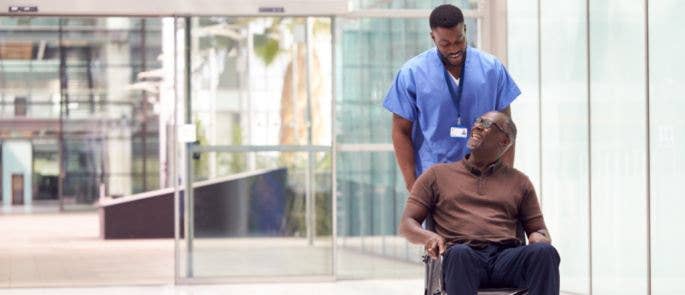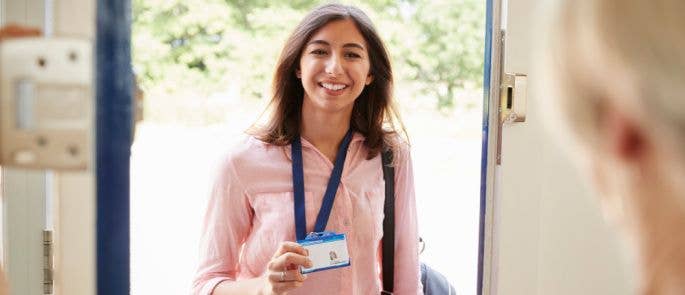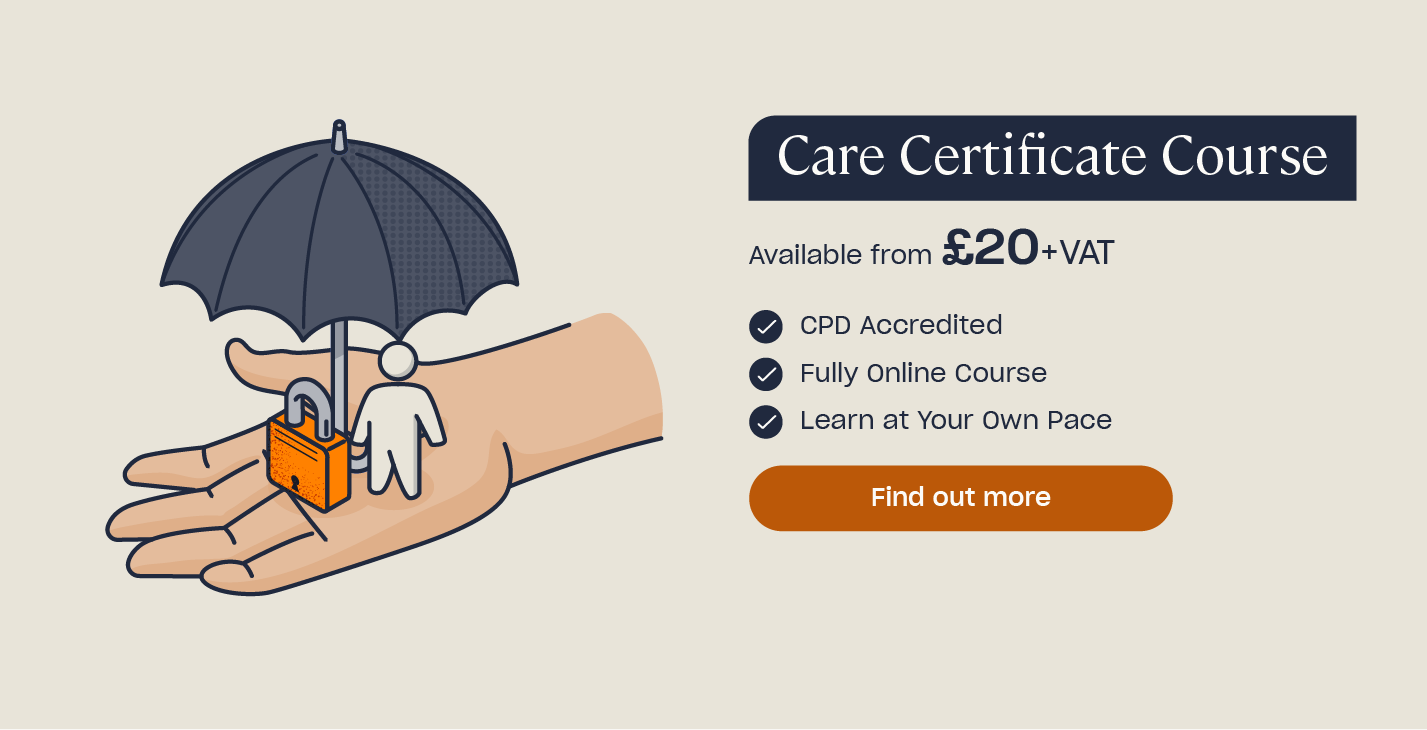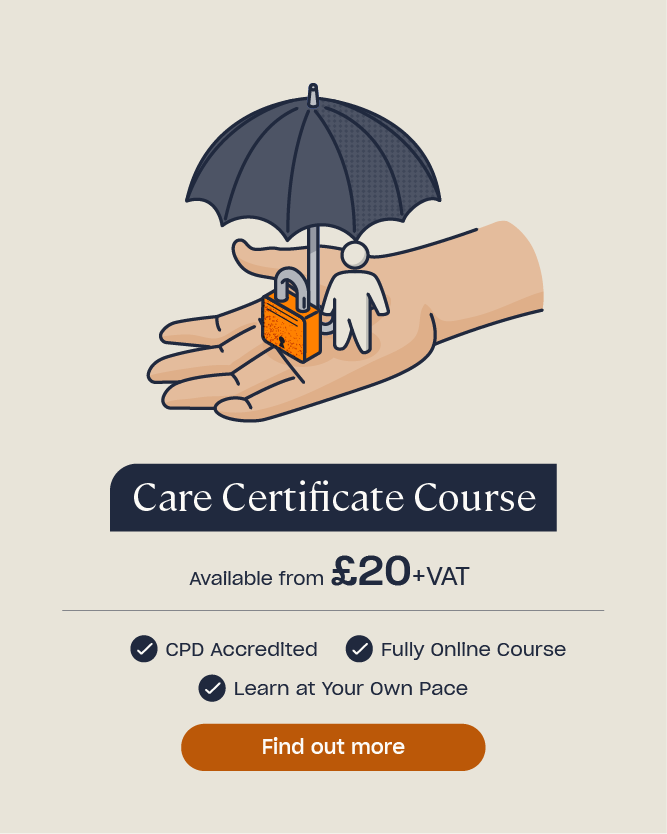What is the Care Certificate & Why is it Important?
All those working in health or social care are required to undertake rigorous training to be able to carry out their job role effectively. This is not only a legal requirement, but it is essential if individuals are to be kept safe and receive the personalised, high-quality care that they deserve. One such type of training that health and social care workers may undertake is the Care Certificate.
The Care Certificate has been helping to standardise the training of people working in the health and social care sector since its introduction in 2015. It aims to ensure that everyone is delivering consistent, high-quality care, and that everyone has received the same level of training. In this article, we will outline what the Care Certificate is, why it was introduced, its components and how you can achieve it.
What is the Care Certificate?
The Care Certificate is a training requirement that forms part of the induction process for those who are new to health and social care. It was designed jointly by Skills for Care, Skills for Health and Health Education England. Skills for Care define it as ‘an agreed set of standards that define the knowledge, skills and behaviours expected of specific job roles in the health and social care sectors.’ It therefore ensures that those working in health and social care have received the same level of training and understand what is expected of them.
The Care Certificate is a key part of a person’s induction, which an employer must provide to meet legal obligations and the essential standards set out by the Care Quality Commission (CQC). However, it does not replace the employer’s own induction, which will be specific to their setting and cover the particular skills and knowledge relevant for that role.
Interested in Learning More?
Our Care Certificate Course offers you the knowledge component needed to complete the Care Certificate, helping to ensure that all health and social care professionals know how to provide high-quality and compassionate care and support.
The training is designed as an introduction and provides health and social care workers with a basis from which they can build upon as their career progresses. For example, the knowledge from the Care Certificate can be used as recognition of prior learning and can be mapped and linked to Regulated Qualification Framework (RQF) units from Level 2 Diploma in Care, Level 3 Diploma in Adult Care, Level 3 Diploma in Healthcare Support, and Level 2 Diploma in Emergency Care Assistance.
Although the Care Certificate is designed for those who are new to health and social care, it can also be beneficial for staff who have worked in the sector for a longer period of time and may want to refresh their training, skills and knowledge.

Who Needs to Complete the Care Certificate?
There is no statutory requirement for health or social care providers to implement the Care Certificate. However, CQC – the independent regulator for health and social care services in England – expect you to complete it if:
- You are new to care.
- You are being inducted as a Healthcare Assistant, an Assistant Practitioner, or a Care Support worker – either a Healthcare Support Worker (HCSW) or Adult Social Care Worker (ASCW).
- You provide direct care in a residential home, nursing home, hospice, or you are a home care worker.
Regulated professions within the sector, including doctors, social workers and occupational therapists, are not required to complete the Care Certificate, as they will achieve similar skills and knowledge as part of their professional training.
Care Certificate Standards
The Care Certificate is made up of 15 standards:
- Understand your role
- Your personal development
- Duty of care
- Equality and diversity
- Work in a person centred way
- Communication
- Privacy and dignity
- Fluids and nutrition
- Awareness of mental health, dementia and learning disabilities
- Safeguarding adults
- Safeguarding children
- Basic life support
- Health and safety
- Handling information
- Infection prevention and control
Each of these 15 standards will be assessed and only once an assessor is satisfied all 15 have been met will they award the certificate.
The Care Certificate follows a specific assessment framework, which lists all of the learning outcomes that must be achieved for each standard. For example, within standard one there are four objectives: understand their own role (learning objective 1.1), work in ways that have been agreed with their employer (1.2), understand working relationships in health and social care (1.3), and work in partnership with others (1.4). Each standard has its own set of objectives which you must meet.

Why Was the Care Certificate Developed?
The Care Certificate was developed to ensure that all health and social care workers receive the same training, and are provided with the information and know-how to be able to carry out their daily job role.
In 2013, the Francis Inquiry report was published which examined the reasons for failings in care. This report identified serious failings in the provision of healthcare and a review, as appointed by the Secretary of State and which was named The Cavendish Review, was commissioned as a result. This review found that there were clear inconsistencies in the training of healthcare assistants and support workers for their roles.
The report that followed this review recommended that a Certificate of Fundamental Care should be developed to ensure that everyone receives the same training and can work at the same standard. This led to the development of the Care Certificate, which was launched in April 2015.
The Care Certificate aims to address everything health and social care workers need to know to carry out their daily role through its 15 standards. It addresses inconsistencies in training so that those receiving care and support, and their families, can be confident that all staff have the same knowledge and skills to be able to deliver safe, high-quality, and compassionate care.
How Do You Complete the Care Certificate?
The Care Certificate is typically completed within two parts: the knowledge and theoretical components, and the practical assessment. To be awarded the Certificate, you will be assessed in your workplace and by a suitable assessor.
It is the role of the employer to appoint an assessor – that is, somebody who assesses whether you meet the standards as set out in the Care Certificate. The assessor must be somebody who is competent in the standard they are assessing, such as a social worker, health professional (such as a nurse) or the employer themselves.
For the knowledge component, you will learn about the theory behind each standard. For example, for Standard 5 (Work in a Person-Centred Way) you will learn about what person-centred care is and how to ensure you always deliver it. You will then be expected to explain what you have learnt, which may be through presentations, records of simulated activity, and written and oral answers to questions. These answers are typically recorded in a set of 15 booklets, with one for each standard.
For the practical aspect of the Care Certificate, you will be observed demonstrating what you have learnt. For example, to complete Standard 5, the assessor would observe you conducting your normal work duties to determine whether you are delivering person-centred care. You may also be required to complete practical work, such as role play, if a relevant situation doesn’t arise and you need to show that you can meet the standard.

The Care Certificate will only be awarded when the assessor is satisfied that there is sufficient evidence that you meet the requirements of each standard. This evidence must be:
- Valid – it must be relevant to the particular standard.
- Authentic – the learner must have produced it.
- Current – the assessor must be confident that the learner still possesses the same level of skills and knowledge.
- Reliable – it must genuinely represent and reflect the learner’s skills or knowledge.
- Sufficient – it must meet, in full, the requirements of the standard.
What Role Can E-learning Play?
E-learning can play a fundamental role for those completing the Care Certificate. An e-learning course, such as that offered by High Speed Training, can cover the knowledge and theoretical components of the Care Certificate. You can learn, in detail, about each of the 15 standards, check your learning through exercises and activities throughout, and have all of your learning in one place. You can also complete the course at your own pace and fit it around your commitments.
What’s more, High Speed Training’s e-learning Care Certificate course includes a downloadable and fully-editable learning portfolio, which comprises all 15 standards and allows you to write answers to a series of questions for each standard. This removes the need for the 15 separate booklets and can be used to show your assessor evidence of previous learning. High Speed Training is a Skills for Care Endorsed Provider, and has received the Skills for Health Quality Mark Digital, meaning that you can learn in confidence that the course meets the highest standards.
The Care Certificate comprises 15 standards and forms part of the induction process for those who are new to Health and Social Care. It helps to tackle inconsistencies in training and ensure that employees have the know-how to deliver high-quality and compassionate care to those they support.
Further Resources:
- Online Care Certificate Course
- Promoting Effective Communication in Health and Social Care
- What is Person-Centred Care and Why is it Important?
- Champions in Healthcare: Role and Responsibilities
- What is Medication Management and Training for Carers?
- Ensuring Human Dignity and Respect in Nursing: A Checklist
- The Health and Social Care White Paper: Summary of Key Points
- Using Technology in Health and Social Care
- What is the Hospital Discharge Process?







